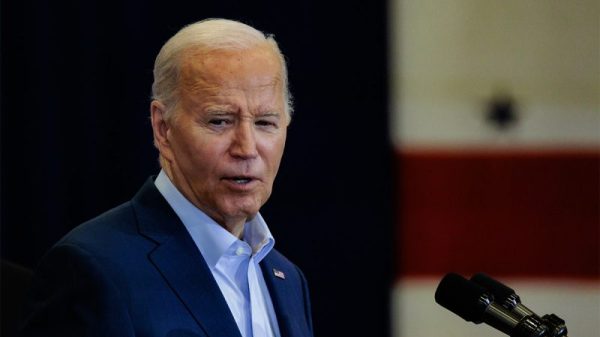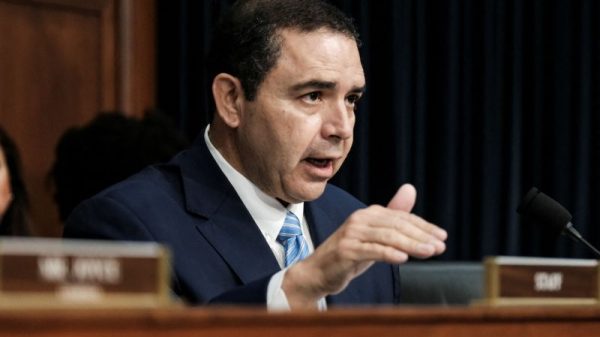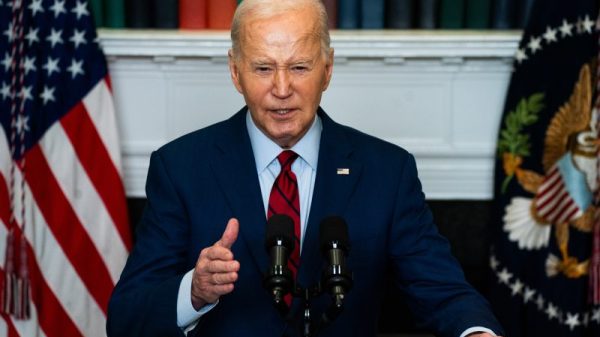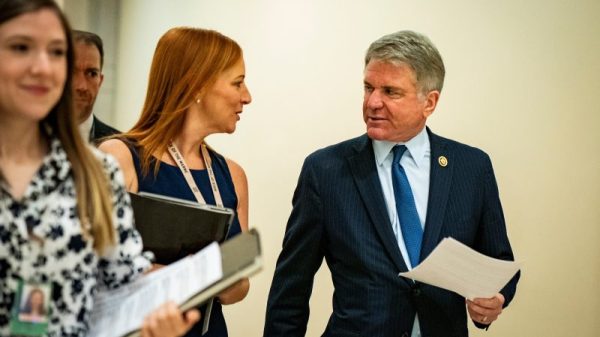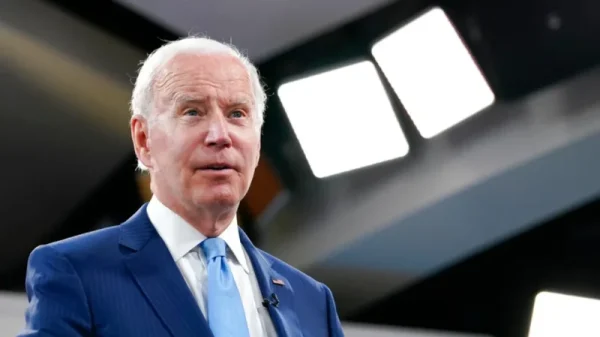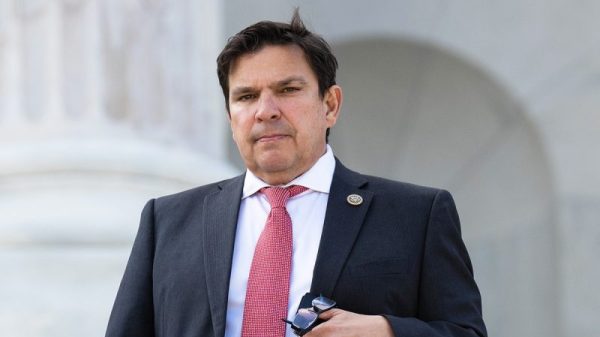House Speaker Mike Johnson had walked into something of an ambush.
President Biden had called the four congressional leaders — Johnson (R-La.) and Senate Minority Leader Mitch McConnell (R-Ky.), along with Senate Majority Leader Charles E. Schumer (D-N.Y.) and House Minority Leader Hakeem Jeffries (D-N.Y.) — to the Oval Office in late February ostensibly to talk about heading off a government shutdown. But Biden and the others had devised a plan to pressure Johnson to push through a Ukraine aid package that was deeply dividing House Republicans.
Biden’s national security adviser, Jake Sullivan, and CIA Director William J. Burns gave a dire presentation, warning that Ukraine would lose the war without immediate U.S. support. Sullivan briefed Johnson on exactly when Ukraine might run out of weapons, laying out in detail when it would no longer have a single artillery shell or air defense interceptor, according to a senior administration official, who spoke on the condition of anonymity to discuss the private meeting.
McConnell, Biden, Schumer and Jeffries all stressed the historic importance of the moment, according to a second senior administration official. After the meeting, Biden pulled Johnson aside for a further one-on-one conversation, the official said.
The bipartisan pile-on showed results Wednesday, when Biden signed the $95 billion foreign aid package into law — just weeks after it seemed dead and beyond any hope of revival.
The bill had faced many hurdles, each more daunting than the last: Johnson insisting that it include immigration provisions loathed by Democrats; former president Donald Trump instantly tanking a compromise border provision; Republicans threatening to depose Johnson if he advanced the bill. Deepening GOP skepticism of Ukraine aid was accompanied by growing Democratic concern about unconditional aid to Israel.
All this time, Ukraine’s soldiers were literally running out of bullets.
“I think there were days along the way here where conventional wisdom was turning against us and people were doubting whether we could get this done and find our way through it,” Steve Ricchetti, counselor to the president, said in an interview. “The president’s direction was to keep talking, keep trying to think of ways that can accommodate the diverse views but still get this done.”
Through high-level intelligence briefings, secretive meetings between the president and the four congressional leaders, and weeks of intensive strategizing, the bill finally passed the House on Saturday with an overwhelming bipartisan vote of 311-112.
The Senate passed the measure late Tuesday, and Biden signed the bill into law Wednesday. He then announced he was sending Ukraine a $1 billion weapons package this week, bringing an end to a saga that seemed to spell a big political defeat for Biden and a major military setback for Ukraine, only to see a course reversal at the last moment.
This story is based on interviews with senior Biden officials, lawmakers and congressional aides, many of whom requested anonymity to detail private conversations and strategies.
The Feb. 27 Oval Office meeting was one of several turning points in the months-long, increasingly desperate effort to pass the foreign aid package amid mounting skepticism of Ukraine among followers of Trump’s “America First” worldview. Many times, Schumer and other boosters believed the aid would never pass, despite the ironclad buy-in from McConnell, who spent enormous political capital pushing the package against the wishes of many in his conference.
McConnell, Schumer and Biden — who have collectively served about a century in Congress — sensed that the inexperienced speaker wanted to find a way to support Ukraine, despite its political toxicity among many Republicans, including himself before he became speaker.
“I thought he really wanted to do the right thing,” Schumer said of Johnson in an interview. “Even at that [Feb. 27] White House meeting where we were pretty tough … I could see he wanted to do it. He didn’t know how. He was worried about his leadership. But he did.”
In remarks on Wednesday before signing the bill, Biden commended the four congressional leaders for pushing the measure through. Getting the aid “to my desk, it was a difficult path — it should have been easier, and it should have gotten there sooner,” the president said. “But in the end, we did what America always does. We rose to the moment, we came together, and we got it done.”
The resurrection of the aid package represented both a turnaround and a dramatic victory for Johnson, who showed he would defy his most hard-line members to enact the legislation. Still, the move angered a number of House Republicans, and the full consequences for the speaker are not yet apparent.
“They don’t always agree, but when it matters most, they stepped up and did the right thing,” Biden said of the congressional leaders. “History will remember this time. History will remember this moment.”
It was Oct. 20 when Biden first made his urgent request for a large foreign aid package: $60 billion for Ukraine, $14 billion for Israel, $10 billion for humanitarian aid and additional money for U.S. border security. The bill’s unwieldy structure stemmed directly from political calculations — as Republicans’ appetite for funding Ukraine ebbed, the White House hoped that adding funds for Israel and for border security would make it hard to oppose.
Shortly after Johnson was elected speaker on Oct. 25, rising almost overnight from a little-known backbencher to second in line to the presidency, White House officials brought him into the Situation Room for a high-level briefing on Ukraine. But Johnson, who had previously voted against every funding bill for Ukraine except the very first, had enormous obstacles to overcome, including threats to oust him from Rep. Marjorie Taylor Greene (R-Ga.) and others if he brought a Ukraine aid bill to the floor.
Biden told his team to explain to Johnson whenever possible what Ukraine’s defeat would mean for Europe and for Russia’s ambitions, according to a senior administration official. To those supporting the aid, nothing less than the cohesion of NATO and the future of the Western coalition was at stake, a point they made repeatedly in private meetings.
The president also told his aides not to attack Johnson personally, a tactic that could easily backfire, but rather to focus their public rhetoric on the historic stakes and pushing House Republicans to act. On Oct. 30, Sullivan called Johnson to address GOP concerns on corruption and waste, explaining that the administration had accountability measures in place to track how Ukraine would use the aid, according to a senior administration official.
McConnell arose from a different Republican tradition than Johnson. He was a defense hawk who believed strongly in defending America’s allies, including Ukraine, putting him on the same side as Democratic leaders in this instance. He asked Schumer to make a pact with him that they would never separate the funds for Israel and Ukraine, to boost the chances of Ukraine aid passing, and Schumer by his own account agreed.
But the ground quickly began to shift beneath McConnell’s feet. His deputies informed him that to have any hope of attracting enough Republican votes in either the House or the Senate, they needed to include tough border provisions. Schumer held a call with his staff in November, and they decided to work on a bipartisan border package, something Schumer believed could help Democrats politically.
That move suddenly tied Ukraine’s fate to immigration, one of the thorniest issues in American politics. Shortly before Christmas, the negotiations appeared to be close to collapse as Biden invited Ukrainian President Volodymyr Zelensky to Washington in an attempt to shame Republicans into funding the war. Yet Zelensky’s appearance generated far less enthusiasm than an earlier visit, when Americans were more energized about defending Ukraine.
As the bill’s chances dimmed, White House Chief of Staff Jeff Zients convened a daily strategy meeting. Aides would try to figure out if Biden should call McConnell and Schumer or summon congressional leaders to the Oval Office. They tried to pick the right moment to call wavering lawmakers, and to decide whether the outreach should be made by top White House officials, retired generals or even Zelensky.
As conditions in Ukraine became more desperate, Biden invited congressional leaders to an intelligence briefing on Jan. 17 in the White House Cabinet Room. Sullivan and Director of National Intelligence Avril Haines stressed that the need for aid was urgent and time sensitive. In the weeks that followed, the White House communicated regularly with Johnson, and officials sensed that he was coming around, a senior official said.
Then, in early February, a bipartisan group of senators announced a deal on a border package, surprising many of their colleagues and appearing to give the aid bill a boost. But Trump warned that passing a tough border bill, as initially demanded by many Republicans, would only help Democrats in the upcoming election, and Johnson declared the compromise “dead on arrival.”
“A lot of our members said it’s not good enough,” McConnell said of the border deal. “And then our nominee for president said he’d rather us not do it at all, so that pretty well eliminated that issue.”
Johnson for weeks had grappled with how to bring more House Republicans on board with the bill. But in the weeks after the tense meeting at the White House on Feb. 27, the speaker began to realize that much of his caucus would not support the bill under any circumstances. Worse, some of his fellow Republicans were threatening to depose him if he insisted on pushing it through.
But by this time Johnson had concluded that enacting the aid bill was the right thing to do, even if it meant relying on Democratic votes or losing his job. “Look, history judges us for what we do,” Johnson said last week. “This is a critical time right now, critical time on the world stage. I could make a selfish decision and do something that’s different, but I’m doing here what I believe to be the right thing.”
As Johnson strategized, he recognized that different parts of the bill would prompt different defections: Many Republicans would oppose Ukraine aid, while dozens of Democrats could withhold their votes because of military aid to Israel. And many Republican lawmakers had also long demanded the issues be separated.
That’s how he landed on the strategy of passing four separate bills: for Ukraine arms, Israel aid, Indo-Pacific funding and other provisions. Each mini-bill would spur defections, but not enough to sink any one of them.
The gambit worked; the four bills passed the House and were then stitched back together and sent to the Senate. In a win for McConnell, nine Senate Republicans who originally opposed the package flipped to yes votes.
“For those who were willing to focus on the facts, it was a compelling argument that we should do what we did,” McConnell said. “Even if it was a request from a presidential personality we don’t want to succeed.”
Paul Kane contributed to this report.








